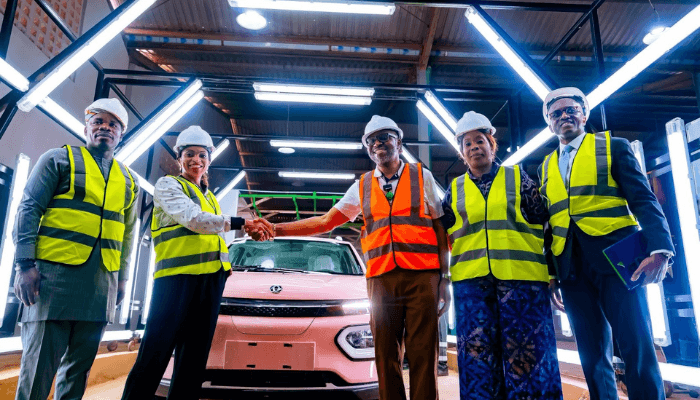For many years, Nigeria’s roads have been dominated by “Tokunbo,” an imported, secondhand vehicles that are often old, fuel-inefficient, and environmentally harmful. These used cars are the default option for millions that have formed the backbone of Nigeria’s vehicle market.
In 2023 alone, Nigerians spent a staggering ₦1.063 trillion on used vehicle imports, a 226% increase from 20. But now, a homegrown company is working to change that.
Nigeria vehicle demand stands at around 720,000 units per year, while local production remains a mere 14,000, according to the U.S. International Trade Administration.
The gap is filled almost entirely by used imports, bringing with them serious economic and environmental consequences.
A joint report by RMI and Sustainable Energy for All (SEforALL) estimates that Nigeria spends $8 billion annually, importing used vehicles cars that often don’t meet emission standards in their countries of origin.
The result of higher pollution, soaring maintenance costs, and rising public health concerns.
The removal of fuel subsidies in 2023 made matters worse. Petrol now sells for over ₦700 per litre, hitting ride-hailing drivers, transport operators, and small businesses hard, and deepening the country’s inflation woes 22.22% as of June 2025.
At the heart of the shift is SAGLEV, a Lagos-based company behind Nigeria’s first electric vehicle (EV) assembly plant. Founded by Gbenga Faleye, SAGLEV is challenging the status quo with clean, cost-effective mobility solutions made in Nigeria.
Meanwhile, a used car from Japan adds almost no value to Nigeria, Faleye said during a recent facility tour attended by senior officials and AfDB President Akinwumi Adesina. “EVs have only 40 moving parts compared to over 4,000 in petrol cars. That’s up to 60% savings on maintenance.”
Currently, the plant assembles 2,500 EVs annually, with plans to scale up to 10,000. The operation is backed by a technical partnership with Dongfeng Motor Corporation, Asia’s second-largest automaker and a longtime supplier to Dangote Group.
SAGLEV’s business model integrates technician training, after-sales service, and parts availability of critical to scaling adoption. “We delayed our launch just to get it right,” Faleye said.
Still, challenges remain. Five containers of EV parts are stuck at Nigerian ports due to customs delays. “Many clearing agents don’t understand the electronic systems,” Faleye explained. “Customers have paid deposits, but we can’t deliver yet.”
Nigeria’s government appears ready to support the industry. Jumoke Oduwole, Minister of Industry, Trade and Investment, commended SAGLEV’s work, saying it aligns with President Tinubu’s Nigeria First Policy, which prioritises local manufacturing.
“This is what domestic industrialisation looks like,” Oduwole said, highlighting how the company could support small businesses, ride-hailing operators, and future exporters.
The National Automotive Design and Development Council (NADDC) has also launched Nigeria’s first National Occupational Standard for EV Maintenance, a blueprint for training technicians at colleges and universities nationwide.
AfDB President Adesina, impressed by the plant’s engineering and gender-diverse workforce, pledged continued support. “The global EV market is expected to hit $59 trillion in 20 years,” he said. “Nigeria must not be left behind.”
AfDB is investing in energy access to support EV infrastructure, having already connected over 28 million Africans to electricity.
Meanwhile, Lagos State is positioning itself as a hub for local manufacturing and exports, Commissioner for Commerce and Investment, Kausara Bada-Ambrose said Lagos will provide a gateway for Nigeria’s EVs to reach international markets.
SAGLEV’s factory has yet to celebrate its grand opening, but its founder is focused on the bigger mission. “We’re not just building cars. We’re building Nigeria’s future,” Faleye said. “Cleaner air, new jobs, reduced imports that’s the real work.”
As the country grapples with inflation, energy costs, and youth unemployment, Nigeria’s shift from Tokunbo to electric mobility could redefine its transportation future—and spark a new era of industrial growth.
Read also:



